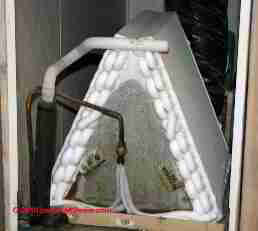How to Keep Your Air Conditioner From Freezing Up
March 25, 2016

Most homeowners don’t know this: Your home’s air conditioner can literally turn into a big, useless block of ice.
And you won’t know this is happening until you see frost building up on the refrigerant lines near the outdoor air conditioning unit. And by then, it’s too late.
What are the consequences of a frozen AC?
Say “goodbye” to comfort in your home and “hello” to an expensive air conditioner repair.
The indoor AC unit’s evaporator coil (the part the cools the air) freezes when:
- There’s low airflow over the evaporator coil
- The air conditioner runs while it’s low on refrigerant
You can help prevent these issues by following these simple tips.
Check the air filter monthly
An indoor unit can freeze due to a dirty air filter.

Clean filter (left) next to a dirty filter (right)
A filthy filter blocks airflow over the evaporator coil, preventing the coil from absorbing enough heat from the indoor air, causing the coil’s temperature to drop to below freezing. Then, moisture in the surrounding air will freeze on the coil, turning it into a glacier.
So check that filter once a month and change it if it looks like the filter on the right in the picture above.
Keep air vents open
Another cause of low airflow is closing the air vents in your home.
Supply vent in a bedroom.
You might think that closing these vents in rooms you don’t use saves you money. But that’s not the case. Your air conditioner’s job is to keep cooling your home until the thermostat says “stop.” Closing vents will not cause the AC to run any less.
What closing a vent does do is increase the pressure in your ductwork. That extra pressure slows down the air conditioner blower motor, which is designed to work against a certain amount of pressure.
And what happens the blower slows down? You guessed it: That means lower airflow over the evaporator coil, which can cause it to freeze up.
For the sake of your comfort, keep those vents open!
Watch for signs of a low refrigerant charge
Refrigerant is the gas in your evaporator coil that absorbs heat from your home’s air.
If your air conditioner is low on refrigerant, then the evaporator coil will drop below freezing temperatures and...well you know the rest.
To know that you’re low on refrigerant before the AC becomes an icy mess, look for these signs:
- AC blows lukewarm air
- Outrageous energy bills
- You hear a hissing or bubbling noise around your AC
If you notice all these signs, that means you may have a refrigerant leak, something an AC technician needs to find and repair.
Get professional maintenance annually
Our final tip? Get a licensed AC tech to tune-up your air conditioner at least once a year. They can check the filter, check the refrigerant charge, check everything that needs to be checked to ensure your AC works in tip-top shape all summer long.
The best time to call for air conditioner maintenance is in spring while technicians aren’t as busy, meaning you can schedule a time that’s more convenient for you.
Has your AC had it’s annual tune-up yet? If not, contact Advanced Air for air conditioner maintenance.
- Posted in:
- Air Conditioning

